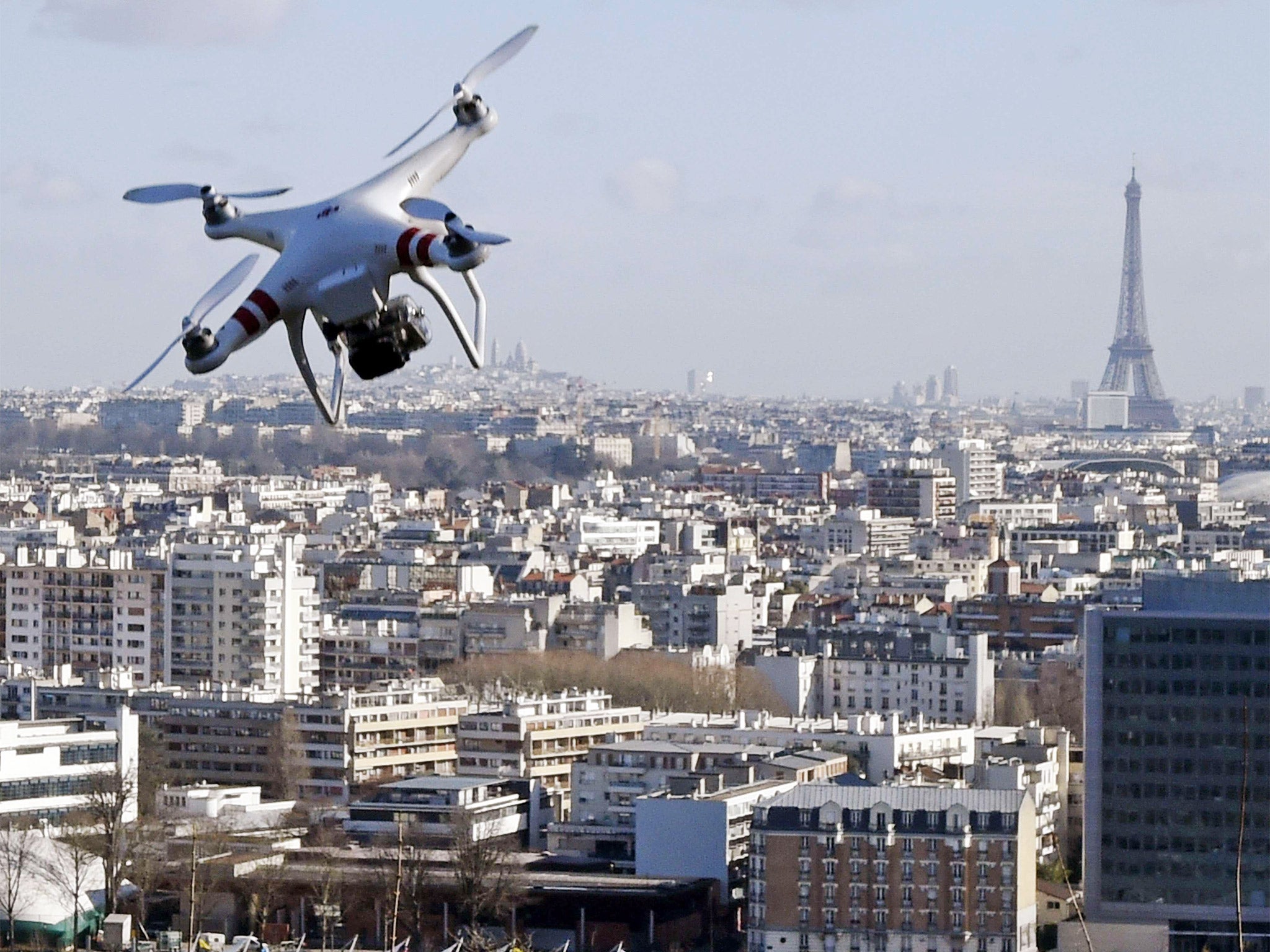France acts to halt rise of drone flights over 'sensitive areas,' but defence ministry admits 'no immediate solution exists' to combat the pilotless aircraft
Sites including a nuclear submarine base and the Elysée Palace have been targeted 60 times since October leading authorities to consider using radio-jamming devices and water canon to halt embarrassing and potentially dangerous incursions

Your support helps us to tell the story
From reproductive rights to climate change to Big Tech, The Independent is on the ground when the story is developing. Whether it's investigating the financials of Elon Musk's pro-Trump PAC or producing our latest documentary, 'The A Word', which shines a light on the American women fighting for reproductive rights, we know how important it is to parse out the facts from the messaging.
At such a critical moment in US history, we need reporters on the ground. Your donation allows us to keep sending journalists to speak to both sides of the story.
The Independent is trusted by Americans across the entire political spectrum. And unlike many other quality news outlets, we choose not to lock Americans out of our reporting and analysis with paywalls. We believe quality journalism should be available to everyone, paid for by those who can afford it.
Your support makes all the difference.Radio-jamming devices and water canon may be deployed by French authorities to protect “sensitive” sites from aerial spying by drones.
Ten new drone flights were spotted over Paris on Tuesday night as the government considers a battery of measures to halt embarrassing – and potentially dangerous – incursions by the tiny, pilotless aircraft.
Police cars chased a drone for around two miles through streets on the eastern edge of the French capital on Tuesday night but failed to catch the aircraft or its operators. Four men bundled the drone into a car before escaping into the heavy traffic on the Paris boulevard périphérique, or ring road.
Bernard Cazeneuve, the French interior minister, told parliament there had been at least 60 drone flights in the last five months over “sensitive” sites in France. The “targets” ranged from most of the country’s nuclear power stations to the Elysée Palace and the US embassy in Paris. An unidentified drone also flew over the Ile Longue submarine base, which houses France’s nuclear deterrent near Brest in Brittany.
Counter-measures under investigation by the defence ministry and 40 French high-tech firms include a form of water-firing “anti-aircraft” canon and powerful beams to jam radio control from the ground. The defence ministry has admitted, however, that “no immediate solution exists, either in France or abroad”.
Security services have studied a host of possible explanations for the flights, ranging from the irritating to the alarming. Some seem to be merely the work of pranksters or hobbyists who post films taken by the drones on the internet. Others appear to involve more elaborate, expensive aircraft and careful coordination, and may be the work of anti-nuclear activists.
The possibility of drones being used to plan, or even carry out, terrorist attacks has been examined but is not considered to be an “active or serious” threat at this stage, officials say.
An Al-Jazeera television journalist, Tristan Redman, 34, was fined €1,000 (£725) on Tuesday after pleading guilty to flying a drone over the Bois de Boulogne in western Paris last month. The British journalist’s lawyer told the court that the Qatar-based TV station had asked him to fly the machine to shoot footage for a news item about the drone incidents in France.
Authorities accept that neither Mr Redman nor Al-Jazeera were responsible for the other drone flights.
Several tourists have been arrested and fined for flying drones in Paris in recent months. Under French law night flying of pilotless aircraft is banned and written permission is needed to fly drones, however small, over urban areas during daytime. The maximum penalty is €75,000 (£54,000).
Small “hobby” drones can be bought on the internet and in specialist shops in France for around €100 (£75). Over 100,000 are estimated to have been bought last year.
Even the larger, more sophisticated drones of the kind seen flying over French nuclear power stations last autumn can be bought for as little as €500 (£360).
Many of the recent drone incidents that are believed to be the work of pranksters or model-aircraft enthusiasts have resulted in films posted anonymously on YouTube in recent weeks. They show beautiful footage shot over sites such as the Eiffel Tower and Montmartre. The intrusions over nuclear sites and “sensitive” buildings such as the Elysée Palace, home of the president, are more disturbing. The interior minister, Mr Cazeneuve, told parliament that there had been at least 60 such “serious” incursions since 5 October last year.
Some flights over power stations hundreds of miles apart were simultaneous and appeared to have been coordinated, he said. Mr Cazeneuve insisted that there was “no immediate cause for concern”. He announced, however, that the government was taking new steps to remind drone owners of the law. The possibility of even steeper penalties is being considered, he said.
Join our commenting forum
Join thought-provoking conversations, follow other Independent readers and see their replies
Comments